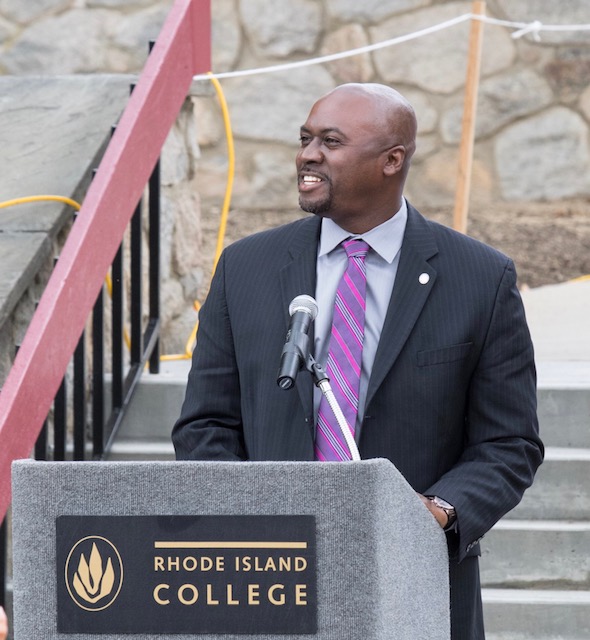
Kentucky native Jason L. Meriwether, who became vice president of student success at Rhode Island College a year ago, likes data — capturing it, curating it and understanding it. It’s critical, he says, to properly prepare students for the world of work and to design strategic, relevant curriculum and programs.
PBN: You are a strong proponent of data mining to help an institution see where it has been and where it should be. To what extent were data-mining practices in effect at RIC, if at all, when you arrived?
MERIWETHER: RIC has a number of systems to collect data, including an incredibility talented director of institutional research and a number of faculty who utilize data to make academic decisions. Over the last year, my team and I have partnered with all of these stakeholders to collect and share data related to student success and completion more frequently and among more members of the campus leadership team. It is important to avoid being “data rich, yet information poor.” With this in mind, we have worked assiduously to centralize data collection and share outcomes with the campus community as it relates to student success trends.
PBN: What kind of information can universities be missing out on if they aren’t paying enough attention to data?
MERIWETHER: Persistence trends are important to capture among various groups. Not paying attention to data as students matriculate could result in a huge loss of students and revenue due to attrition. Capturing data about first-year students, for example, could allow an institution to discern trends about performance in certain courses that may require additional academic support or tutoring. If an academic program shows potential for robust growth, tracking data around student interest, performance, and completion may compel scholarship investment in order to help grow or sustain the number of students in that major. Student engagement in evening or weekend programs can also be an important area … Students will vote with their feet and leave an institution if programming isn’t satisfactory or doesn’t compare to what their friends at other colleges are experiencing.
PBN: You’ve been quoted as saying that students need to be engaged via digital media platforms and through face-to-face interaction. Are the two mediums polar opposites, in your view?
MERIWETHER: These areas actually have the same value since each of these spaces (digital and in-person) are where students dwell. The same way that trust is built through face-to-face interaction, students often build trust by engaging and communicating in digital venues. Many adult learners — defined as students who are 25 and older by the American Council on Education — value digital engagement as well, while others still prefer in-person interactions to conduct business on campus and to learn. It is prudent for college leaders to design services such as tutoring, course registration, bill pay, answering questions, or even applying for admission that give students the option for digital or person-to-person interaction … universities must be nimble.
PBN: Is data mining a big enough part of the school’s curriculum, in your view, to ready students to enter the world of work?
MERIWETHER: RIC faculty and administrators have a voracious appetite for data about student success and completion, which informs curricular planning. Since 85 percent of RIC’s graduates remain in Rhode Island, providing quality internships to complement the delivery of curriculum within the academy is a valuable and data-driven part of the student experience. Measuring effectiveness and quality of these experiences helps prepare our students to join, influence and ultimately drive Rhode Island’s economic engine.
PBN: Is there such a thing as too much reaction to data in your view in terms of decision making, budgetary considerations, etc.?
MERIWETHER: Data can indeed create inaccurate reactions without proper context. If data is consistently shared, discussed and interpreted among stakeholders with proper attention to a variety of historical trends, decision-making can be much more robust and informed. Long-term budget decisions can’t be made based upon a snippet of information that only tells one part of the story. Much like any other complex organization, colleges and universities must allow adequate time to review and discern a plethora of data so that the decision is not reactive, but reasonable, sound, and responsive to the needs of students.
Susan Shalhoub is a PBN contributor.












